Conquering Phobias
Giving Fear a Swift Kick in the Pants!
Compassionate and Supportive Therapists
Our team consists of compassionate therapists and counsellors who specialize in phobia counselling. They provide a safe and non-judgmental environment where you can explore your fears and receive the support you need to overcome them.
Evidence-Based Strategies
We utilize evidence-based strategies and techniques to address phobias effectively. Our therapists employ proven therapeutic approaches to help you challenge negative thought patterns, gradually confront your fears, and develop coping mechanisms for long-term success.
Virtual Counselling for Convenience
Our virtual counselling option allows you to access therapy from the comfort and privacy of your own space. Through secure and confidential video sessions, you can receive support conveniently, eliminating concerns about travel or scheduling conflicts.
In-Person Counselling for Personalized Support
We offer in-person counselling services at our offices in Mississauga, Toronto, and Milton, and offer the convenience of home-visits across the GTA for a more immersive therapeutic experience. In-person sessions allow for deeper connections and tailored support for helping combat your phobia(s).
Understanding the Nature of Phobias
Phobia counselling helps individuals understand the nature and origin of their phobias. Skilled therapists provide psychoeducation on phobias, explaining how they develop and manifest in different ways. By gaining knowledge about their phobia, individuals can better comprehend their triggers and reactions, leading to increased self-awareness.
Identifying Underlying Causes
Phobia counselling aims to identify the underlying causes or experiences that contribute to the development of a phobia. Therapists work collaboratively with individuals to explore their past experiences, traumas, or learned behaviours that may have triggered their phobia. By uncovering these underlying causes, individuals can gain insight into their fears and begin the process of healing and overcoming them.
Exposure Therapy and Desensitization
Phobia counselling often incorporates exposure therapy and desensitization techniques. Therapists guide individuals through gradual exposure to their phobic triggers in a controlled and safe manner. Through repeated exposure, individuals can learn to manage their fear response, gradually reduce anxiety, and develop a sense of mastery over their phobia.
Developing Coping Strategies
Phobia counselling equips individuals with effective coping strategies to manage their phobia-related anxiety. Therapists teach relaxation techniques, breathing exercises, and mindfulness practices to help individuals stay calm in the face of their fears. By learning and practicing these coping strategies, individuals can regain a sense of control and reduce the impact of their phobia on their daily life.
Cognitive Restructuring
Phobia counselling involves cognitive restructuring techniques to challenge and change negative thought patterns associated with the phobia. Therapists help individuals identify and replace irrational beliefs and catastrophic thinking related to their fear. By adopting more rational and realistic thoughts, individuals can reframe their perceptions and reduce the intensity of their phobic reactions.
Increased Self-Confidence and Empowerment
As individuals progress through phobia counselling, they experience increased self-confidence and empowerment. Overcoming fears and facing phobic triggers in a supportive environment builds resilience and self-efficacy. By conquering their phobia, individuals gain a sense of accomplishment, leading to improved self-esteem and a belief in their ability to handle future challenges.
Expanded Opportunities and Quality of Life
Phobia counselling opens up new opportunities and improves the overall quality of life for individuals. By successfully managing their phobia, individuals can engage in activities and experiences that were previously off-limits due to fear. This newfound freedom allows individuals to fully participate in social events, pursue their goals, and enjoy a more enriching and fulfilling life.
Long-Term Relapse Prevention
Phobia counselling focuses on providing individuals with the skills and strategies necessary for long-term relapse prevention. Therapists help individuals develop an action plan to maintain their progress and manage potential setbacks. By having a relapse prevention strategy in place, individuals can effectively navigate future challenges related to their phobia and continue their journey towards lasting recovery.
Embark on your transformative journey alongside our team of compassionate therapists and counsellors

Shani Hussain
Clinical Supervisor
Jennifer Paul
Family Wellness Specialist
Medina Ismayilova
Registered Psychotherapist
Rayya Brown
Social Worker
Tin Man Cheung
Social Worker
Stephanie M.
Cuddle Therapist
Dabeer H.
Cuddle Therapist
Hinnah Khan
Client Experience Adviser
Kevin Kameoka
Office AdministratorFees
Fees are on a sliding scale and depend on staff qualifications and experience, as well as the billing method.
Out-of-Pocket:
$100-$160
Private Insurance:
$150-$200
In order to claim the cost of your session please check your policy and ensure that the type of therapist you wish to see (e.g., Psychotherapist, Behaviour Analyst, or Social Worker) is listed under your coverage.
Warning!
Trustindex verifies that the original source of the review is Google. I initially booked an appointment at Hatch-Me to deal with some personal issues I was having. Through my first discussions with my therapist, a number of new things have come up that I decided I should also work on. Needless to say, my therapy sessions have been evolving and I now have a list of items I am addressing with a goal of improving my life. I am very grateful to have found Hatch-Me and my therapist Marina. Through the ups and downs I am happy to say that my life, my satisfaction with my life and how I conduct myself in difficult situations has been trending upwards towards a way I am more proud of. I have been skeptical about therapy, and know that successful therapy depends heavily on a good match between patient and therapist, but I'm SO glad to have jumped in at Hatch-Me. The team at Hatch-Me is compassionate, attentive, insightful and just an all around pleasure to deal with. To anyone reading this who is considering therapy, just do it. It's difficult to explain how it has benefited me, but I look forward to every appointment I have coming up. Shani is an absolute pleasure to deal with as well.Trustindex verifies that the original source of the review is Google. My life was completely different before I met Marina Stamatakos. I remember when I first came to Marina, being anxious about absolutely everything as I am a pretty anxious person, and she was the one who helped me. Throughout our sessions she became not only a therapist for me, but a coach and a friend. I have not met a person with whom I would be able to speak so easily and fairly. Marina helped my mental health a lot; she helped to change my vision of different things and showed me plenty of strategies to help myself in stressful situations. I will be forevermore thankful to Marina, to wonderful Shani, one of the kindest people I have ever met, and to the whole community of Hatch-Me. You are saving people and you are saving our mental health!Trustindex verifies that the original source of the review is Google. Rayya at Hatch me, has been a huge part of my success with my relationship and has given both of us a renewed sense of hope for our future with her enthusiasm and perspectives. We have been gifted with her insights from her education and wonderful inspiration.Trustindex verifies that the original source of the review is Google. I was misdiagnosed and had wasted years of my life going to therapists that did nothing to help me. Just cliche empathy statements and nothing useful. Shani truly breaks the mold as a therapist. He helps even when I’m in a crisis and text him last minute. He sacrifices his time to make sure I’m safe. If you have depression, anxiety, or literally any hardship and need solid guidance, choose Shani! My friend had another therapist from this company and loved her too. I recommend everyone to hatch meTrustindex verifies that the original source of the review is Google. Shani is amazing at what he does, he’s incredibly knowledgeable, caring, and an amazing support to have on your healing journey. Also especially great with neurodivergence which I appreciate a lot.Trustindex verifies that the original source of the review is Google. Supportive kind and heard me out - strategies were great to boost my daily routine and productivity and helped me understand myself….. Thanks for the kindness and support….Trustindex verifies that the original source of the review is Google. Shani is incredible, he was by my side in an uphill battle and helped me prevail. Thank you Good Sir.Trustindex verifies that the original source of the review is Google. This may not be the place where I started my self-healing era, but it is the place where I made the most progress. I was referred to this place, and specifically to Shani, and I was told that in his therapy he was kind, understanding, knowledgeable, and practical. Shani is all that and more. He is also generous, straightforward, empathetic, compassionate, and most of all curious. Shani's one and only goal is to make sure that his patients are able to stand on their own two feet again, and face life, and all it's challenges head-on with confidence and belief in themselves; I have not known him to judge, presume, or invalidate. In our sessions, Shani made sure to first fully understand my challenges; what I faced, and how it affected me; and only after he had that understanding did we discuss a tailored treatment and next steps. That is only part of what I am willing to share, but know that if you truly want to heal and make concrete changes to your life, Shani is the therapist you want, period.Trustindex verifies that the original source of the review is Google. I am extremely thankful for having Shani during our challenging time,he is immensely supportive and helpful, a friend a brother to my loved one who had hard time trusting others. He is always a compassionate and positive influence for my loved one who now always looks forward to meeting Shani .He provides a comfortable and empathetic guidance. He is a friend and big support to us all . Thank you so much Shani .Trustindex verifies that the original source of the review is Google. I am grateful to have had Shani be a resource and support during a difficult transition in my life. I had enough self-awareness to google 'therapy' and Hatch-Me came up. It was the reviews that led me to finally submit a request to connect with someone, and I met Shani. I understand why he encourages his patients, once we are in a better headspace, to share our experiences here in order to potentially attract other souls searching for support. There is no pressure, but an understanding of how reviews drive awareness - I am here for it. If you are looking for some guidance, support, or a path to a better headspace, I encourage you to check HM out and meet with anyone on the team. Shani - you are an angel. You provided appropriate therapeutic support and relevant guidance to me during a dark time in my life. Your dedication is unparalleled. You are so accommodating, work around my timings, when I'm late, hungry or when I am in a situation where I need a call or text - you do your best to be there, and you are. It tells me that you actually care about me, my wellbeing, and you want to see me thrive. I hope I am fortunate enough to know you forever. I can assure you I will continue to visit HM whenever I need to kick my negative thoughts in the 'behind'and focus on budling the life I know I deserve because, I Love myself enough to try a little more each day. Thank you for that. From my experience, Shani is patient, but he will also confront your thought patterns when needed. He will support you with reassurance and also challenge you to move outside of a comfort zone. He will be clear and forthright about what one needs to do (unique to them) for overall health and wellbeing. If you care and love yourself enough to want to make some positive changes in your headspace, I encourage you to make an appointment. I can assure you, you won't regret it. Thank you again Hatch-Me and Thank you always Shani. Love, an exposed Gill.






